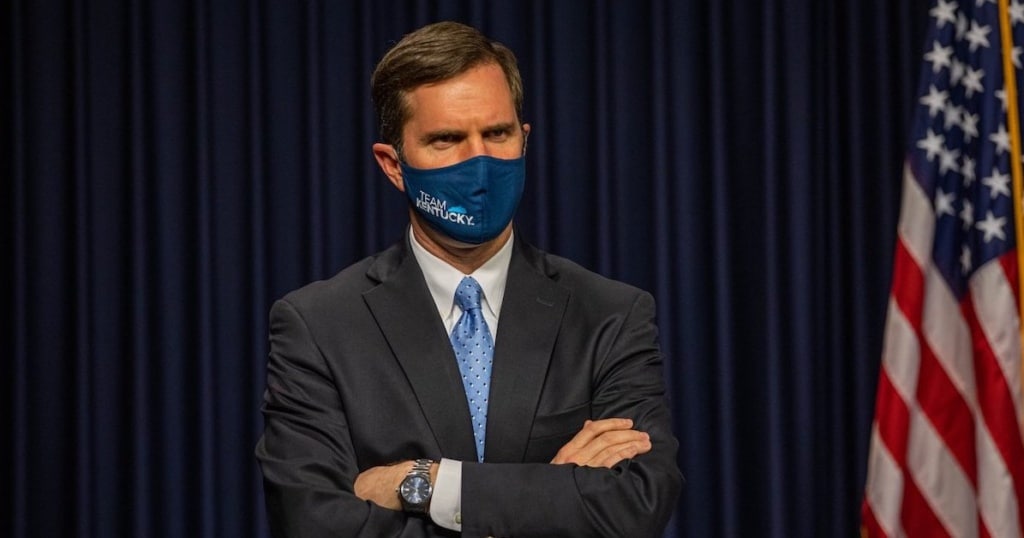Gov. Andy Beshear is asking a court to block three new Kentucky laws that limit his emergency powers during the coronavirus pandemic.

The challenge was filed Tuesday night, shortly after the Republican-led state legislature voted overwhelmingly to override Beshear’s vetoes of the measures.
Unless a court steps in, the new laws will limit the length of Beshear’s emergency orders and allow businesses and schools to open during the pandemic, as long as they follow CDC guidelines.
In a statement, Beshear wrote that the legislature is limiting his ability to implement lifesaving public health measures.
“Today, the General Assembly attempted to surrender to COVID-19 and accept the casualties. As your Governor, I cannot let this happen,” Beshear said. “I have filed this action to continue to fight for the protection of all Kentuckians.”
Meanwhile, the rate of new coronavirus cases has slowed in Kentucky, though the state still tallies dozens of virus-related deaths every day.
Republican legislators have been frustrated with Beshear’s handling of the pandemic and the fact that, that outside the annual lawmaking session, state law gives the governor authority to respond to states of emergency on his own.
But since they hold 75% of seats in the legislature, Republicans were able to easily pass measures last month curtailing Beshear’s powers while boosting their own.
Beshear vetoed the bills last month, but the legislature easily overrode the actions on Tuesday.
The three measures Beshear is challenging in the 61-page lawsuit filed in Franklin Circuit Court are:
House Bill 1: allows businesses and schools to stay open during the coronavirus pandemic as long as they follow CDC guidelines, superseding Beshear’s orders. In the complaint, Beshear wrote that the measure is constitutional because it “places absolute and arbitrary power in the federal government over the Governor.”
Senate Bill 1: limits a governor’s emergency orders to 30 days unless the legislature extends them. That means Beshear will have to call lawmakers back to Frankfort for a special legislative session to renew orders after they adjourn on March 30.
Senate Bill 2: gives the legislature more oversight over emergency administrative regulations and allows public comment.
The Supreme Court of Kentucky ruled in favor of Beshear last year after Republican Attorney General Daniel Cameron challenged Beshear’s use of executive orders during the state of emergency.
But Republicans have promised to create guardrails for Beshear, saying the party’s success in legislative elections last year amounts to a “mandate” against his coronavirus policies.
After vetoing the bills, Beshear sent a letter to Republican leaders asking them to postpone their override votes until after the pandemic.
But on Tuesday, the first day lawmakers were in Frankfort after a three-week break, the override votes sailed through both legislative chambers with little discussion.
During a speech Tuesday, Republican Senate President Robert Stivers said that if the governor wants to renew any of his emergency orders, he can just seek approval from the 138-member legislature.
“This is a prudent vote for the people who are elected to set the policy in this state,” Stivers said.
Democrats could do little besides voice opposition.
Democratic Rep. Buddy Wheatley of Covington said Republicans are giving more power to the federal government.
“Let’s not tie his hands, let’s let him continue this job, let’s let him be the governor and not diminish his powers like this,” Wheatley said.
The legislature also voted to override Beshear’s three other vetoes on Tuesday, which included these longtime Republican wish-list items:
House Bill 2: gives Republican Attorney General Daniel Cameron authority to regulate abortion providers in Kentucky, in addition to the state health cabinet.
House Bill 3: allows people to file lawsuits against state government in their home counties, instead of Franklin Circuit Court located in Frankfort. Republicans, especially former Gov. Matt Bevin, have long claimed they aren’t treated fairly by the judges in Franklin Circuit Court.
House Bill 5: prevents the governor from temporarily reorganizing boards and cabinets while the legislature isn’t in session.






